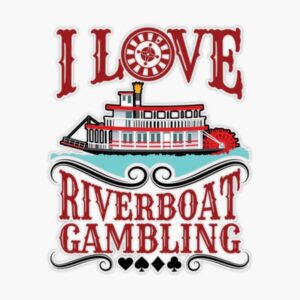If you’ve ever watched a few old western movies, you would probably have witnessed scenes of a cowboy strutting into a saloon ready to pull the trigger on the first man who looks him in the eye. Wild Bill is a classic example of this. Not only was he a cold-blooded killer, but he was also notoriously known for his love of poker and table games.
Gambling in itself was hugely popular in the days of the Old West, but it was far from legal in most states. As a result, gamblers and casino operators needed to find new ways in which they could continue to offer games without the harsh regulations and legal issues that came with operating on land. Then came the birth of the first-ever riverboat casinos.
But at what point did boat gambling become so popular in the states and why is it that after many states legalized gambling there are so many still in existence today? Let’s rewind and find out!
Gambling In The Old West

In the eyes of the law, gambling is a pastime with a varied scope of acceptability. Even though it is legal throughout most of the world, in some parts, it is entirely forbidden and can result in a hefty fine or even prosecution if you get caught.
As gambling is a form of entertainment, these consequences may sound harsh. But just over 100 years ago, they were much worse. Gambling in the states was a massively controversial topic back in the late 1800s and 1900s, particularly in the Old West. As it was illegal in most states, gamblers found innovative and creative ways to cheat the system if they wanted to play poker or blackjack. This is around the same time when the loophole of riverboat gambling was first discovered. There are the most famous wild west gamblers.
Initially, riverboats operated solely for transportation purposes because of how quickly and reliably they could move goods and make deliveries. However, new routes for railroads began to pop up around the country. This enabled people to get from one destination to another much faster. As a result, the use for and popularity of riverboat casinos declined.
This was also the time when the American Civil War started, a time where many of the Southern States were at loggerheads with the North. The chaos that erupted from the war contributed heavily to the stagnation of riverboat entertainment at the time.
The Solution
Though gambling wasn’t legal on land, a few cunning individuals took the law into their own hands and decided it could be legal if gambling on water. Very soon, riverboat gambling set sail and gained immense popularity in the years that followed.
Riverboat casinos were technically not legal still. However, they opened up a loophole in the law that regulators and governments couldn’t do much about. The riverboat gambling trend was growing, and more importantly, succeeding at bringing in high rolling clientele from various states.
River Boat Legalisation
As governments became increasingly aware of these shady operations, and tightened gambling laws. Afterward, the popularity of riverboats eventually began to fade. In the late 1980s and early 1990s, however, riverboat casinos made a huge comeback. This is when Louisiana and Iowa became the first states to legalize riverboat casino gambling.
In 1989, the first fully recognized riverboat casino legally operated in Iowa. Witnessing the success and unprecedented demand for this new style of gaming, more states began to follow suit. A few months later, Illinois, Missouri, and Mississippi passed riverboat casino laws.
Working Out the Kinks
Legislators in Louisiana passed a new bill that made riverboat gambling legal, with a couple of stipulations. Gambling needed to take place on docked ships that are a minimum of 120 feet long and resemble the look and feel of a nineteenth-century paddle boat.
They also needed to accommodate at least 600 passengers and make scheduled runs to the mainland regularly. Any vessels that did not meet the legal requirements at the time were could not operate as a gambling venue or offer any class of casino games.
Riverboat Gambling Today
These days, hundreds of riverboat casinos operate throughout the U.S., with each one employing several hundred staff. This small section of the gambling industry is responsible for generating billions of dollars in gaming revenue each year. And the popularity of riverboat casinos continues to increase.
In Louisiana, legislators have capped the number of riverboat casinos to 15. But in places like New Orleans, there are exceptions in place that permit a limited number of riverboat casinos to operate.
Any passengers looking to play casino games on riverboats in Indiana should prepare themselves for being out on the water a long time — as should the staff. All riverboats operating gambling activities are legally required to cruise for a minimum of four hours before they can re-dock. The legislation allows gamblers to partake in games thirty minutes before the cruise and for another thirty minutes afterward.
Unlike the state of Louisiana, for riverboat casinos in Indiana, it doesn’t matter whether the vessels are modern or historic. As long as the vessel can accommodate at least 500 passengers and has a length of 150 feet or more, they’re good to go. Slot machines, table games, and all other types of class II casino games are permitted onboard.
A Luxurious Experience

Riverboat casinos are now more popular than ever. Even though there were stringent policies that these vessels had to comply with in the beginning, the rules are much more relaxed these days. Gamblers can set sail and have the opportunity to play all of their favorite casino games while enjoying the decadence of a cruise ship experience or visiting a Caribbean destination.
Most riverboat casinos now operate 24/7. And they feature everything from a spa, gym, restaurants, bars, cinemas, and other onboard amenities in addition to a fully-fledged casino. Most of them also feature rooms and deluxe suites where passengers can recharge their batteries, and wake up to another day of full-on gambling and fun.




